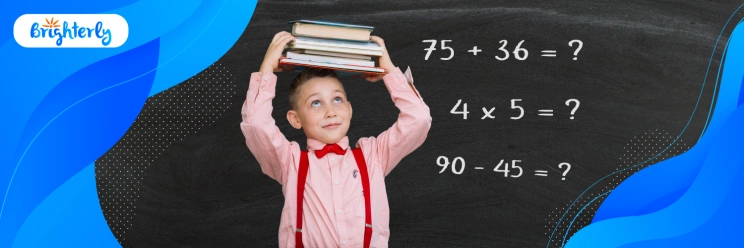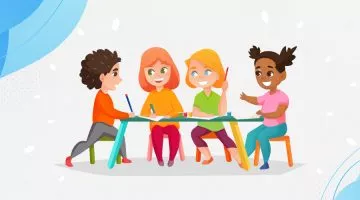Common Topics in Math for 6-Year-Olds to Learn
Updated on January 5, 2024
Math isn’t new for six-year-olds since they will likely have learned basic counting and number identification before that. As kids develop confidence in playing with numbers, parents, and tutors can introduce them to more complicated concepts. The article will throw light on some topics that will make children more proficient in math.
Math Topics to Boost 6-Year-Olds’ Math Skills
Time
The ability to tell the time is necessary in our daily lives, yet it may be difficult for kids to master. You should first help your kids understand how time relates to their lives before teaching them to interpret it. With simple activities and games, children will develop an awareness of the passage of time from a young age.
Kids learn about time and seasonal changes throughout their school years. Six-year-olds memorize the hour and half-hour markings of a clock and are able to tell how many minutes comprise an hour and how many hours are in a day. Also, they get to differentiate between the “quarter to” and “half past” concepts. With the help of top math learning sites like Brighterly and math games for 6-year-olds, your child’s time-telling skills will improve.
Money
Educating your kids about money is essential in preparing them for life in the real world. You can introduce physical money, worksheets, or money math games for 6-year-olds to practice skills and enhance their understanding of the concept. Brighterly’s money games, virtual coins, and other activities involving the concept can help your kids learn about money in a fun way.
At six years, pupils should be able to recognize monetary denominations and sum currencies in coin and bill form. Combining whole dollars and cents may be difficult for six-year-olds; however, with constant practice, your kids will appreciate the financial applications of math.
Addition and Subtraction
When teaching addition and subtraction concepts to kids, you should start with addition first. Most children understand the idea of gaining better than losing, thanks to the interactions with their parents and toys in their toddler years. When they get comfortable with addition, introduce them to subtraction.
But don’t take away toys as a way to teach kids subtraction since the approach can fuel resentment toward learning in children. Instead, use math worksheets for 6-year-olds or play games that subtly teach subtraction and addition. Also, don’t forget about the importance of repetition as a system for reinforcing ideas you’ve introduced to children.
Counting
Counting is among the basic math skills 6-year-olds should master, as it paves the way for other math topics on this list. Six-year-olds can count to a great extent, often up to 200, which reveals the vastness of numbers to kids. Counting as a math concept forms the foundation for a more complex mathematics for 6 year old that the your may face in the future. When the kids practice more, they improve their 6 year old math skills.
You can use counting along with your day-to-day activities or just use simple math games. To help your 6 year old struggling with maths, and make them enjoy counting, use math toys or other attractive colorful items. They can arrange items in a line and stand facing the items, counting them aloud from 1 to 10 first before they move to double-digit numbers.
Add fascinating and complex exercises like backward counting to your math for 6-year-olds curriculum. You can use a simple range, like having them count from 10 down to 1 or from 20 to 1. Don’t go above 50 so that the activity won’t get too complex and tedious for the students
Fractions
Fractions should be more of a visual concept for children than a written one. For example, children may be unable to comprehend what ⅚ means on paper. But they will have no trouble understanding it when you explain that if they eat five slices of pizza out of a six-sliced pizza, they have consumed ⅚th of the whole pizza.
Before moving to more complex fractions, make sure your youngster understands basic fractions such as a half, a whole, and smaller fractions like ⅓, ⅔, etc. Halves (½) and wholes (1) are concepts children quickly grasp with the help of everyday activities. You can help your kids learn the concept of fractions by describing relatable scenarios, like how two half-glasses of Coke produce a full glass.
Shapes
Geometry is one of the central themes that six-year-old kids should understand because of its prevalence in daily life. Shapes around us are often in 2D or 3D forms, but six-year-olds won’t know the difference without your help. Make it easy for your kids to recognize basic shapes like cylinders, rectangles, squares, circles, and triangles.
If you want to make your 6-year-old understand geometry better, you can try games where kids try to identify different shapes. A better way to do this is to get involved by showing them shapes you see on everyday objects and asking them to call the shape the image reminded them of. You can then teach them to draw the shapes and show them how different they are.
Another way you can make this happen is by teaching your kids craft-making. You can ask your child to cut a triangular object from a magazine, and then you will draw the real shapes on a cardboard and tell your 6 year old math learner to point to which shape their cut-out is. This is a very creative way for your kids to learn shapes and geometry as part of the 6th grade math curriculum.
Conclusion
Maths for a 6 year old can be very challenging because, let’s face it, a lot of numbers and symbols don’t make any sense at the beginning. So it is not out of place that your 6 year old mathematics learner will look to you for help. It is your job to help them figure out this new terrain.
These steps above are geared towards teaching you how to teach 6 year old maths. You can use math manipulatives for a more hands-on approach, but the knowledge of fundamental math topics you need to focus your efforts on is the first step to building your child’s interest in math.











